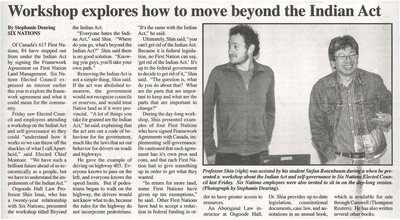"Workshop Explores How to Move Beyond the Indian Act"
- Publication
- Tekawennake News (Ohsweken, Ontario), 12 Jun 2013, p.15
- Full Text
- Workshop explores how to move beyond the Indian ActBy Stephanie Dearing, SIX NATIONS
Of Canada's 617 First Nations, 84 have stepped out from under the Indian Act by signing the Framework Agreement on First Nation Land Management. Six Nations Elected Council expressed an interest earlier this year to explore the framework agreement and what it could mean for the community.
Friday saw Elected Council and employees attending a workshop on the Indian Act and self-governance so they could "understand how it works so we can throw off the shackles of what I call Apartheid," said Elected Chief Montour. "We have such a brilliant future ahead of us economically as a people, but we have to understand the impediments of the Indian Act."
Osgoode Hall Law Professor Shin Imai, who has a twenty-year relationship with Six Nations, presented the workshop titled Beyond the Indian Act.
"Everyone hates the Indian Act," said Shin. "Where do you go, what's beyond the Indian Act?" Shin said there is no good solution. "Knowing you guys, you'll take your own path."
Removing the Indian Act is not a simple thing, Shin said. If the act was abolished tomorrow the government would not recognize councils or reserves, and would treat Native land as if it were provincial. "A lot of things you take for granted are the Indian Act," he said, explaining that the act sets out a code of behaviour for the government, much like the laws that set out behaviour for drivers on roads and highways.
He gave the example of driving on highway 403. Everyone knows to pass on the left, and everyone knows the speed limits. But if pedestrians began to walk on the highway, the drivers would not know what to do, because the rules for the highway do not incorporate pedestrians. "It's the same with the Indian Act," he said.
Ultimately, Shin said, "you can't get rid of the Indian Act. Because it is federal legislation, no First Nation can say, 'get rid of the Indian Act.' It's up to the federal government to decide to get rid of it," Shin said. "The question is, what do you do about that? What are the parts that are important to keep and what are the parts that are important to change?"
During the day-long workshop, Shin presented examples of four First Nations who have signed Framework Agreements with Canada, implementing self-governance. He cautioned that each agreement has it's own pros and cons, and that each First Nations had to give something up in order to get what they wanted.
"In return for more land, some First Nations have given up tax exemptions," he said. Other First Nations have had to accept a reduction in federal funding in order to have greater access to resources.
An Aboriginal Law instructor at Osgoode Hall, Dr. Shin provides up-to-date legislation, constitutional documents, case law, and annotations in an annual book, which is available for sale through Carswell (Thompson Reuters). He has also written several other books.
- Creator
- Dearing, Stephanie, Author
- Media Type
- Newspaper
- Item Types
- Articles
- Clippings
- Description
- This article reports on the workshop on the Indian Act and self-governance presented to the Six Nations Elected Band Council by Osgoode Hall Law Professor Shin Imai.
- Publisher
- Tekawennake News
- Place of Publication
- Six Nations of the Grand River, ON
- Date of Publication
- 12 Jun 2013
- Date Of Event
- 7 Jun 2013
- Subject(s)
- Personal Name(s)
- Montour, William ; Imai, Shin ; Rosenbaum, Stefan.
- Corporate Name(s)
- Six Nations Elected Band Council ; York University.
- Local identifier
- SNPL002075v00d
- Language of Item
- English
- Geographic Coverage
-
-
Ontario, Canada
Latitude: 43.06681 Longitude: -80.11635
-
- Creative Commons licence
 [more details]
[more details]- Copyright Statement
- Public domain: Copyright has expired according to Canadian law. No restrictions on use.
- Copyright Date
- 2013
- Copyright Holder
- Tekawennake News
- Contact
- Six Nations Public LibraryEmail:info@snpl.ca
Website:
Agency street/mail address:1679 Chiefswood Rd
PO Box 149
Ohsweken, ON N0A 1M0
519-445-2954



